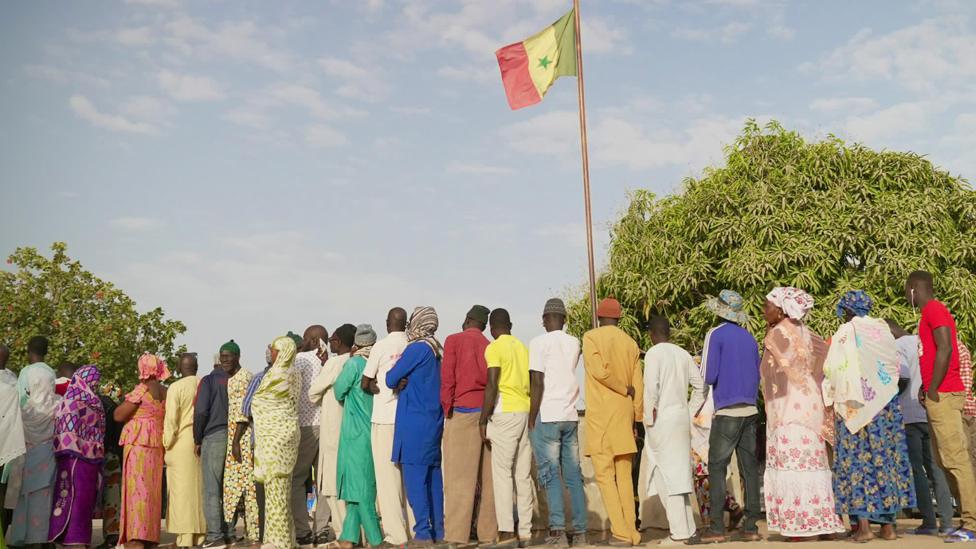Senegal election: Voters choose new president after political crisis
- Published

Seven million people, some seen here queuing in Ndiaganiao, are eligible to vote
People in Senegal have been voting for a new president in a delayed election after weeks of political unrest.
Long queues of voters were witnessed across the country as they flocked to choose from 17 presidential candidates.
After he voted, outgoing President Macky Sall warned candidates against making premature claims of victory.
The election had been due to take place last month but Mr Sall postponed it, triggering deadly opposition protests and a democratic crisis.
Seven million people were eligible to vote in the mainly Muslim West African nation, which had until then been praised as a bastion of democracy in the region.
Polling stations are now closing after a largely calm day of voting as most people are returning home to prepare to break their fast, which happens at sunset during the Muslim fasting month of Ramadan.
Among those in the running for Senegal's top job is the governing BBY coalition's candidate, former Prime Minister Amadou Ba, 62. After casting his ballot in the capital, Dakar, he said he was "very confident" of a first-round election victory.
His main challenger, Bassirou Diomaye Faye, expressed similar confidence after voting, along with his two wives, in his hometown of Ndiaganiao, which is about 100km (62 miles) from Dakar.
This election is the election of the youth. If I had one advice for other young people, it would be to come and vote. That’s the only way we can help ourselves"

The 44-year-old was released from jail just 10 days ago, after being detained since April 2023 on charges of insurrection, which he said were politically motivated.
His ally, opposition leader Ousmane Sonko, was also freed from prison following an amnesty intended to calm tensions. He voted in his southern stronghold of Ziguinchor, saying they expected a "dazzling victory".
I came to vote because today is an important day for our nation. There is a lot at stake and that’s why we should care"

Popular with young people, he is not allowed to stand because of a series of charges he says are trumped up. He and his now-disbanded Pastef party are backing Mr Faye.
A 25-year-old voter in Ndiaganiao, who only gave her first name, Mbissine, told the BBC: "This election is the election of the youth. If I had one [piece of] advice for other young people, it would be to come and vote. That's the only way we can help ourselves."
At the same polling station, 84-year-old Diégane Gueye, who walked with the assistance of a cane, said: "I came to vote because today is an important day for our nation. There is a lot at stake and that's why we should care."
Senegal elections: A key vote in one of Africa's most stable countries
There have been complaints from a polling centre in the town of Keur Massar, about 20km north-east of Dakar, because some people were not been able to vote as they had old ID cards, even though their names were on the voters' roll. The new cards note that Keur Massa is now its own voting district and not part of Pikine as it was until 2021.
A BBC team in Keur Massar says the military police have been deployed as tension has risen outside the polling station at a school in the town. The electoral commission has now said it will try to resolve the situation.
On Friday, former President Abdoulaye Wade and his PDS party threw their support behind Mr Faye, after his own son, Karim Wade, was forced to withdraw over his dual French-Senegalese citizenship.
For the first time in more than a decade, a female candidate is in the race. Anta Babacar Ngom, 40, leads the ARC party.
Results are expected within days and a second round is likely, because of the large number of contestants. A candidate needs more than 50% of the vote to be declared the winner.
The world will be watching to see if the election process goes some way to restoring Senegal's now-bruised reputation.
Speaking to the BBC earlier this week, President Sall said that he had "no apology to make" for postponing the election, which was originally due to be held on 25 February.
"I have done nothing wrong," he said, adding that the decision to delay the vote was not taken unilaterally, but was because of electoral concerns raised by members of parliament.
"All the actions that have been taken have been within the framework of the law and regulations."